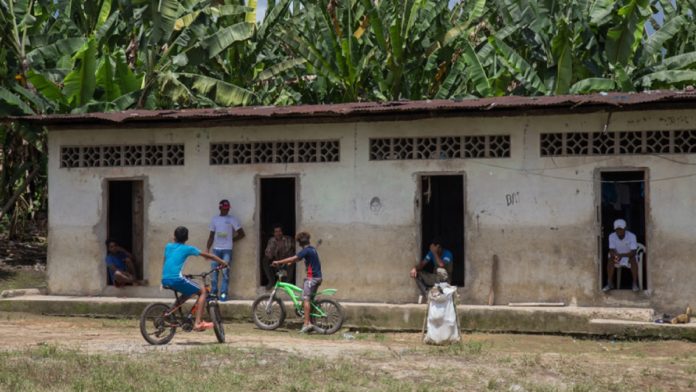Luz de America, Ecuador – Carlos and Maria spent their childhoods working more than 10 hours a day on a plantation, earning less than minimum wage. They never got days off, while living in overcrowded camps without electricity or clean drinking water, they said.
The pair, who spoke with Al Jazeera on condition that their last names be withheld, met during that time and spent most of their lives together, eventually getting married and having eight children. Maria had to work during her pregnancies, she said, and did not receive medical care during childbirth.
“There was no light. We used lighters and candles to light up the night,” Maria recalled, speaking on the patio of the family’s small, stifling home in Luz de America, Ecuador. “We could not get clean water and bathrooms. We were enslaved and mistreated. The camps were full of families, so we had no room to sleep in. Sometimes we had to sleep in the kitchen.”
Carlos, who began working at Furukawa Plantaciones in the 1980s when he was just seven, said he was unable to attend school, since the closest one was 10km (6 miles) away on foot.
“We lived like animals,” he said. “We requested changes, but we never received them. The only thing they cared about was money, not workers. We had no insurance or legal benefits. Our living conditions were inhumane.”
The couple, who said they were dismissed from their jobs after protesting against working conditions in 2019, are part of a group of more than 100 current and former workers seeking legal compensation from Furukawa, a Japanese company that has operated in the Ecuadorian cities of Santo Domingo, Los Rios and Esmeraldas for around six decades. The workers, mostly of Afro descent, harvested abaca, a plant that yields a type of fibre used in products such as tea bags and currency.
Workers say that despite the company raking in millions of dollars in profits, they earned less than minimum wage and were denied basic benefits and labour protections. In 2019, the Ecuadorian Ombudsman’s Office issued a report citing a pervasive system of servitude and “modern slavery” at Furukawa’s plantations. It detailed numerous violations, including child labour, inadequate pay and a lack of safety protections.
Subsequent investigations by the state culminated last month, when an Ecuadorian judge ruled that a criminal trial on charges of “human trafficking for the purpose of labour exploitation” against Furukawa could proceed, in what observers say is a landmark decision for labour rights in the country and beyond.
Long road
According to Alejandro Morales, a lawyer representing the affected workers, the case has the “potential to eradicate modern slavery and colonial practices” that continue to this day.
“The significance of this case cannot be overstated, as it brings to light the persistent existence of … modern-day slavery in this country since colonial times,” Morales told Al Jazeera, noting that the case “is not an isolated incident in the agribusiness industry”.
The workers he is representing, who will participate in the upcoming trial, say they are seeking financial compensation for the years they spent enduring harsh conditions.
The road to this juncture has been a long one. After the 2019 ombudsman’s report and subsequent government investigations, Ecuador’s Ministry of Labour ordered Furukawa to temporarily halt operations, and the state issued a public apology over its failure to prevent human rights abuses at the plantations.
A Santo Domingo court in 2021 ordered the company to compensate workers who had filed complaints. But workers who spoke with Al Jazeera last month said they had yet to receive any compensation, while the company continues to operate.
For its part, Furukawa maintains that it followed all protocols and made reparations after past complaints, including the demolition of camps. Lawyer Pedro Jerves, who is defending one of the company’s managers, told Al Jazeera that workers had agreed to the terms of their employment, adding that Furukawa has taken numerous steps to ensure its operations adhere to all relevant standards.
“We have complied with safety protocols, and today, we have installed potable water tanks and electricity. We have carried out social work that demonstrates that people are indeed living well,” Jerves said. The company has consistently rejected allegations that conditions at its plantations were akin to modern-day slavery.
‘Brighter future’
For members of the Afro community in Ecuador, the case is about protecting fundamental human rights.
Jaqui Gallegos, an activist of Afro descent, told Al Jazeera that the treatment of workers is “deeply rooted in structural racism that persists in the culture”, with Afro-Ecuadorians facing widespread discrimination across the country. More than 40 percent of Afro-Ecuadorians reportedly live below the poverty line, and they face challenges in accessing education and employment.
Meanwhile, former Furukawa workers are hopeful that justice will prevail, and that they will someday receive compensation.
Adela, a 67-year-old woman who spent most of her life working in the plantations, told Al Jazeera that she hopes children in her community today “can go to school and have a brighter future, and … prevent this story from being repeated”.
Carlos and Maria, who still struggle to make ends meet, are also determined to break the cycle and ensure a better future for their own sons and daughters. As they speak, their young children play nearby with a handful of old toys, occasionally interrupting their parents to ask for snacks or drinks.
“Abuses by the company still pierce our hearts like daggers … [but] despite the many lives lost, we, the survivors, will continue to wage this war,” Maria said. “We will not rest until justice is served.”
This story was produced with the support of One World Media and the International Women’s Media Foundation.

